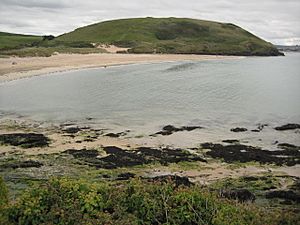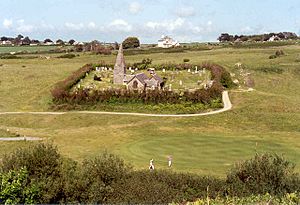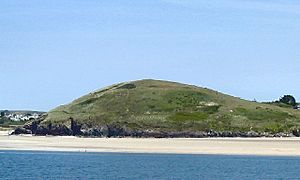Brea Hill facts for kids
Brea Hill is a round hill located in beautiful north Cornwall, England. Its name, Bre, means 'hill' in the Cornish language. You pronounce it "Bray Hill". This interesting hill sits right next to the River Camel estuary.
Brea Hill is about 62 metres (203 ft) tall. At its very top, you can find ancient Bronze Age burial mounds. These mounds are called tumuli and were used to bury people long, long ago. The ground beneath Brea Hill is made of a type of rock called Devonian slates.
Contents
Where is Brea Hill Located?
Brea Hill is found at the southern end of Daymer Bay. It is nestled between the small towns of Trebetherick and Rock. These towns are part of the civil parish of St Minver Lowlands. The hill is about five miles northwest of the town of Wadebridge.
What Does Brea Hill Look Like?
On its western side, Brea Hill rises steeply from the water's edge. To the north and south, it gently rises from low sand dunes. If you look to the east, the sand dunes turn into a golf course and grassy fields.
Just below the hill on the east side is St Enodoc's Church. This church is famous because the well-known poet Sir John Betjeman is buried there.
Exploring Brea Hill
The South West Coast Path is a long walking trail that goes along the western side of Brea Hill. There's also another path that goes around the eastern side. Brea Hill is mostly covered in grass and doesn't have many trees. However, there is a small wooded area low down on its southern side. You can find rough footpaths that lead all the way to the top of the hill and to the ancient burial mounds.
Brea Hill in Poetry
Brea Hill is mentioned in a poem by John Betjeman called 'Back from Australia'. In his poem, Betjeman uses a slightly different spelling, calling it Bray Hill. He also mentions Stepper, which refers to Stepper Point, another landmark nearby.
Here are some lines from his poem:
At home in Cornwall hurrying autumn skies
Leave Bray Hill barren, Stepper jutting bare,
How vast the sky is, looked at from the land.
And hold the moon above the sea-wet sand.
The very last of late September dies
In frosty silence and the hills declare
 | Toni Morrison |
 | Barack Obama |
 | Martin Luther King Jr. |
 | Ralph Bunche |




